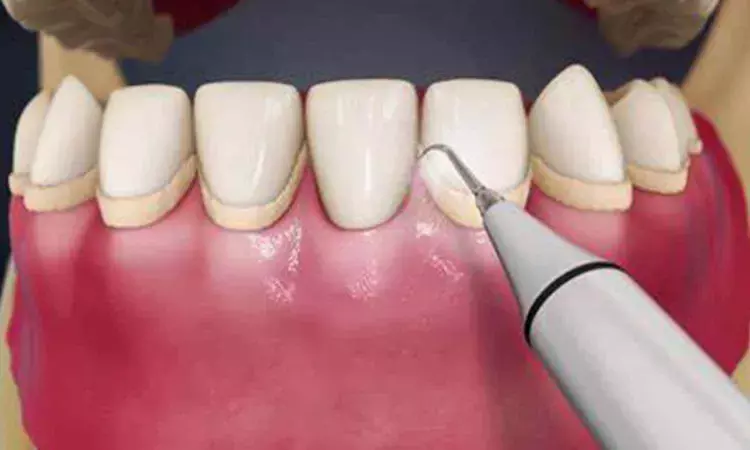- Home
- Medical news & Guidelines
- Anesthesiology
- Cardiology and CTVS
- Critical Care
- Dentistry
- Dermatology
- Diabetes and Endocrinology
- ENT
- Gastroenterology
- Medicine
- Nephrology
- Neurology
- Obstretics-Gynaecology
- Oncology
- Ophthalmology
- Orthopaedics
- Pediatrics-Neonatology
- Psychiatry
- Pulmonology
- Radiology
- Surgery
- Urology
- Laboratory Medicine
- Diet
- Nursing
- Paramedical
- Physiotherapy
- Health news
- Fact Check
- Bone Health Fact Check
- Brain Health Fact Check
- Cancer Related Fact Check
- Child Care Fact Check
- Dental and oral health fact check
- Diabetes and metabolic health fact check
- Diet and Nutrition Fact Check
- Eye and ENT Care Fact Check
- Fitness fact check
- Gut health fact check
- Heart health fact check
- Kidney health fact check
- Medical education fact check
- Men's health fact check
- Respiratory fact check
- Skin and hair care fact check
- Vaccine and Immunization fact check
- Women's health fact check
- AYUSH
- State News
- Andaman and Nicobar Islands
- Andhra Pradesh
- Arunachal Pradesh
- Assam
- Bihar
- Chandigarh
- Chattisgarh
- Dadra and Nagar Haveli
- Daman and Diu
- Delhi
- Goa
- Gujarat
- Haryana
- Himachal Pradesh
- Jammu & Kashmir
- Jharkhand
- Karnataka
- Kerala
- Ladakh
- Lakshadweep
- Madhya Pradesh
- Maharashtra
- Manipur
- Meghalaya
- Mizoram
- Nagaland
- Odisha
- Puducherry
- Punjab
- Rajasthan
- Sikkim
- Tamil Nadu
- Telangana
- Tripura
- Uttar Pradesh
- Uttrakhand
- West Bengal
- Medical Education
- Industry
Dental Scaling Linked to Lower Stroke Risk in Periodontal Patients: Study

Researchers have found in a new research that regular dental scaling was significantly associated with a reduced risk of stroke in individuals with moderate-to-severe periodontal disease. Thefindings highlight a potential preventive role of dental scaling beyond oral health.
This study aimed to evaluate the association between the frequency of dental scaling and the risk of stroke among individuals with moderate-to-severe periodontal diseases and verify the effect of regular dental scaling on stroke risk in this population.
In this retrospective study, 25,758 subjects with moderate-to-severe periodontal diseases were selected from the Korean National Health Insurance Service-National Health Screening cohort database. Based on the frequency of dental scaling, the subjects were divided into three groups: regular, occasional, and infrequent.
Restricted cubic splines were used to evaluate hazard ratios (HR) with 95% confidence intervals (CI) for stroke. Additionally, landmark analysis was conducted to strengthen the reliability of the Results.
Results: There were 293, 111, and 38 stroke cases in the infrequent, occasional, and regular group, respectively. The adjusted HR for stroke in the regular group, compared to that in the infrequent group, was 0.40 (95% CI, 0.29-0.57). In the landmark analysis with follow-up after 1 year and after 2 years, the adjusted HR in the regular group compared to that in the infrequent group was 0.41 (95% CI, 0.28-0.60) and 0.50 (95% CI, 0.33-0.76), respectively. Regular dental scaling was significantly associated with a reduced risk of stroke in patients with moderate-to-severe periodontal diseases. These findings may suggest a potential preventive role of dental scaling beyond oral health.
Further studies are needed to explore the underlying biological mechanisms linking periodontal care to stroke prevention and to explore causal relationships between dental scaling and stroke risk.
Reference:
Kim YR, Son M, Kim SR. Association between regular dental scaling and stroke risk in patients with periodontal diseases: evidence from a Korean nationwide database. Epidemiol Health. 2025 Apr 19:e2025020. doi: 10.4178/epih.e2025020. Epub ahead of print. PMID: 40259824.
Dr. Shravani Dali has completed her BDS from Pravara institute of medical sciences, loni. Following which she extensively worked in the healthcare sector for 2+ years. She has been actively involved in writing blogs in field of health and wellness. Currently she is pursuing her Masters of public health-health administration from Tata institute of social sciences. She can be contacted at editorial@medicaldialogues.in.
Dr Kamal Kant Kohli-MBBS, DTCD- a chest specialist with more than 30 years of practice and a flair for writing clinical articles, Dr Kamal Kant Kohli joined Medical Dialogues as a Chief Editor of Medical News. Besides writing articles, as an editor, he proofreads and verifies all the medical content published on Medical Dialogues including those coming from journals, studies,medical conferences,guidelines etc. Email: drkohli@medicaldialogues.in. Contact no. 011-43720751


